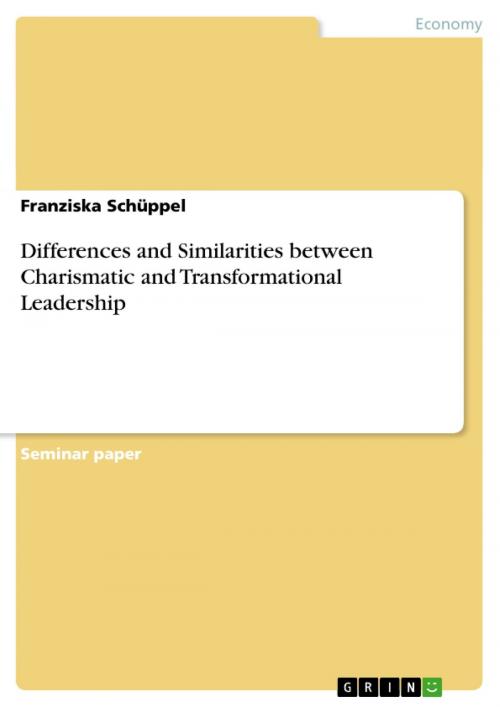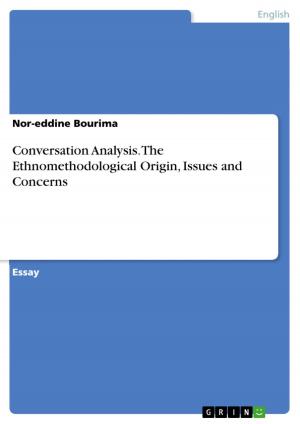Differences and Similarities between Charismatic and Transformational Leadership
Business & Finance, Human Resources & Personnel Management| Author: | Franziska Schüppel | ISBN: | 9783656603986 |
| Publisher: | GRIN Verlag | Publication: | February 26, 2014 |
| Imprint: | GRIN Verlag | Language: | English |
| Author: | Franziska Schüppel |
| ISBN: | 9783656603986 |
| Publisher: | GRIN Verlag |
| Publication: | February 26, 2014 |
| Imprint: | GRIN Verlag |
| Language: | English |
Seminar paper from the year 2013 in the subject Business economics - Personnel and Organisation, grade: 1,0, AKAD University of Applied Sciences Leipzig, language: English, abstract: Especially in crises, companies need leaders to help them asserting themselves on the markets and getting them through difficult times. However, not every leader always comes to a satisfying result, since there might be a mismatch between the company's situation and the attitudes and practices of its leader. As a result, the style of leadership plays a decisive role concerning a company's achievements in the majority of cases. Since the style of leadership might be the critical factor when it comes to the success of a business, scientists have analyzed several leadership styles, which all have different characteristics and therewith also varying effects on the respective companies. Two of the most common styles are the charismatic and the transformational leadership. As their names already indicate, each of these styles has its own characteristic features that affect the surroundings in a variety of ways. But as different as these two leadership styles might seem, they also have similarities based in their principles and attitudes. Since the opinions among scientists partly seem to be divided concerning the resemblance of the two styles on the one hand and the diversity on the other hand, this paper consequently deals with the task to expose the differences and similarities between charismatic and transformational leadership. First, in Chapter 2 Leadership in general a short definition of leadership in general is given, for describing the universal understanding of leadership and its components. For being able to highlight the corresponding differences and similarities between the two special leadership styles that have to be examined, Chapter 3 Charismatic Leadership and Chapter 4 Transformational Leadership analyze the characteristics as well as the components of charismatic and transformational leadership in order to get a better understanding of their basic attributes. The following Chapter 5 Differences between Charismatic and Transformational Leadership shows the main distinctions between these two leadership styles, based on the perceptions of the previous chapters. Chapter 6 Similarities between Charismatic and Transformational Leadership underlines on the other side the general similarities and parallels between the two. Chapter 7 Résumé finally summarizes the results and concludes the paper.
Seminar paper from the year 2013 in the subject Business economics - Personnel and Organisation, grade: 1,0, AKAD University of Applied Sciences Leipzig, language: English, abstract: Especially in crises, companies need leaders to help them asserting themselves on the markets and getting them through difficult times. However, not every leader always comes to a satisfying result, since there might be a mismatch between the company's situation and the attitudes and practices of its leader. As a result, the style of leadership plays a decisive role concerning a company's achievements in the majority of cases. Since the style of leadership might be the critical factor when it comes to the success of a business, scientists have analyzed several leadership styles, which all have different characteristics and therewith also varying effects on the respective companies. Two of the most common styles are the charismatic and the transformational leadership. As their names already indicate, each of these styles has its own characteristic features that affect the surroundings in a variety of ways. But as different as these two leadership styles might seem, they also have similarities based in their principles and attitudes. Since the opinions among scientists partly seem to be divided concerning the resemblance of the two styles on the one hand and the diversity on the other hand, this paper consequently deals with the task to expose the differences and similarities between charismatic and transformational leadership. First, in Chapter 2 Leadership in general a short definition of leadership in general is given, for describing the universal understanding of leadership and its components. For being able to highlight the corresponding differences and similarities between the two special leadership styles that have to be examined, Chapter 3 Charismatic Leadership and Chapter 4 Transformational Leadership analyze the characteristics as well as the components of charismatic and transformational leadership in order to get a better understanding of their basic attributes. The following Chapter 5 Differences between Charismatic and Transformational Leadership shows the main distinctions between these two leadership styles, based on the perceptions of the previous chapters. Chapter 6 Similarities between Charismatic and Transformational Leadership underlines on the other side the general similarities and parallels between the two. Chapter 7 Résumé finally summarizes the results and concludes the paper.















